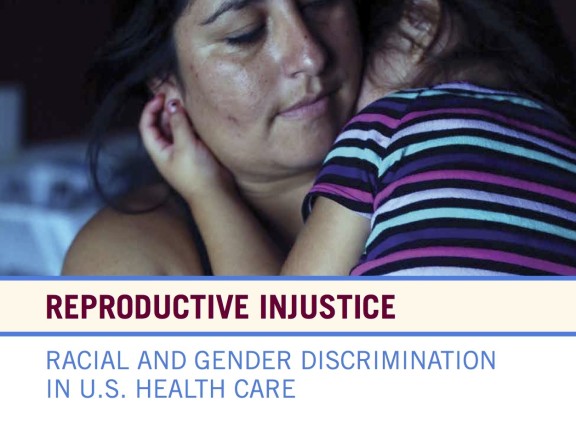Published September, 2014
Reproductive Injustice: Racial and Gender Discrimination in U.S. Health, Sister Song Women of Color Reproductive Justice Collective, National Latina Institute for Reproductive Health, and the Center for Reproductive Rights (2014)

Prepared as a shadow report for the United Nations Committee on the Elimination of Racial Discrimination (CERD), this report evaluates the U.S. record on addressing racial and gender discrimination in sexual and reproductive health care. Highlighting racial disparities in maternal mortality and discrimination against non-citizen women in access to health care, the report focuses on the need for policy change as well as proactive measures to address the structural forms of discrimination that inhibit the ability of women of color and immigrant women to exercise their human right to health.
The rate of women dying in childbirth in the United States more than doubled from 1990 to 2013, and Black women are dying at rates almost four times higher than White women. Poverty, persistent disparities in sexual and reproductive healthcare and lack of health insurance are major factors contributing to maternal mortality, all of which have a disparate impact on communities of color.
The report also cites the exclusion of both documented and undocumented immigrants from public health insurance as another contributing factor to high maternal mortality among women of color. Even documented immigrants must wait at least five years to be eligible to enroll in Medicaid and undocumented immigrants are barred by law from buying private health insurance under the Affordable Care Act.
The report includes a number of recommendations that could address racial and gender based discrimination including; increasing coverage for low-income women in states that have “opted out” or Medicaid expansion; increased access to affordable contraceptive and family planning services; improved data collection and investigations of maternal mortality; elimination of the five year waiting period for documented immigrant eligibility for Medicaid and allowing undocumented immigrants to buy health insurance under the Affordable Care Act.
Copyright Information: CHLP encourages the broad use and sharing of resources. Please credit CHLP when using these materials or their content. and do not alter, adapt or present as your work without prior permission from CHLP.
Legal Disclaimer: CHLP makes an effort to ensure legal information is correct and current, but the law is regularly changing, and the accuracy of the information provided cannot be guaranteed. The legal information in a given resource may not be applicable to all situations and is not—and should not be relied upon—as a substitute for legal advice.